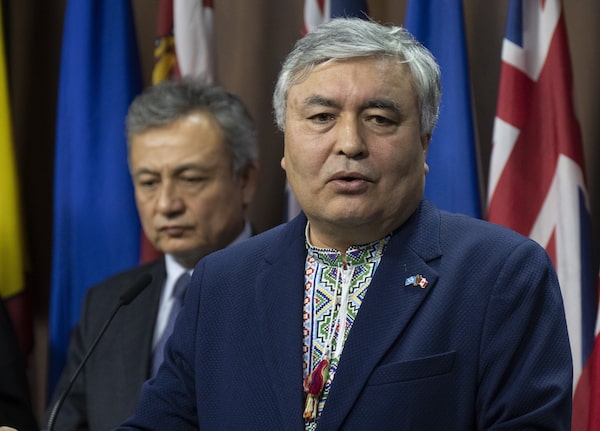
Uyghur Rights Advocacy Project head Mehmet Tohti speaks during a news conference in Ottawa, on Feb. 1.Adrian Wyld/The Canadian Press
A watchdog created by the federal government to probe corporate wrongdoing abroad says it is opening an investigation into whether Nike Canada is selling products made with Uyghur forced labour in China.
It’s one of two investigations announced Tuesday by the Canadian Ombudsperson for Responsible Enterprise (CORE). The second will look into whether Vancouver-based gold mining company Dynasty Gold is benefiting from coerced labour at an open-pit mine in China’s Xinjiang region.
Tuesday marks the first time that the CORE has commenced an investigation since opening its doors to receive complaints in March, 2021. Its initial assessment reports are the first the office has published since it began operating in May, 2019.
A Globe and Mail investigation earlier this year found the CORE had yet to complete a single review or investigation of a company in its four years, despite dozens of allegations concerning Canadian companies operating abroad and human-rights abuses.
The federal watchdog is investigating these companies in response to complaints filed last year by a coalition of human-rights groups. They asked for a probe into allegations that some products sold by 14 Canadian companies – most of them subsidiaries of large U.S. firms – are made with forced labour in China. The watchdog is expected to decide on the remaining complaints in the coming weeks.
The 28 rights and advocacy groups include the Uyghur Rights Advocacy Project, Canadians in Support of Refugees in Dire Need and the Raoul Wallenberg Centre for Human Rights, founded by former Liberal justice minister Irwin Cotler. Lead counsel for the complainants are Sarah Teich and David Matas.
Ombudsperson Sheri Meyerhoffer said in an interview that the organization is hiring human-rights investigators who speak and read Chinese to probe the Nike Canada and Dynasty Gold complaints.
She said the investigators have asked that their names be kept secret to avoid reprisals by Beijing against Chinese nationals working for them. Canadian companies are expected to respect Canadian standards for human-rights and environmental protection when they work outside of Canada.
Ms. Teich, a human-rights lawyer, said to her knowledge it’s the first time a government-affiliated body anywhere in the world has decided to investigate Nike over its alleged ties to forced labour in China.
“This should push bodies in other jurisdictions to investigate their respective subsidiaries of multinational clothing companies. This can be used as a precedent around the world,” she said.
China’s northwestern Xinjiang region, which produces one-fifth of the world’s cotton, has been the focus of reports by media, researchers and rights groups who say Beijing committed grave human-rights violations against the largely Muslim Uyghur population, as well as other minorities. In the region, authorities have been accused by Western governments and human-rights groups of widespread use of forced labour.
Ms. Meyerhoffer defended her office when asked at a press conference Tuesday why it took so long for the CORE to start its first investigation.
“The underlying reality is that we were the first office of its kind in the world; we had no model to follow,” she told reporters. “And so we took our time to build out an accessible and secure complaint mechanism combined with a fair and transparent process.”
The CORE said it decided to launch an independent fact-finding investigation into Nike Canada after its initial assessment of the complaint, which it said “raises serious allegations regarding the possible abuse of the international human right to be free from forced labour.”
The complaint alleged that Nike has “relationships or supply chain links” with six companies linked to Uyghur forced labour, according to research from the Australian Strategic Policy Institute (ASPI) think tank and Laura Murphy, a professor at Sheffield Hallam University.
In responses to the CORE, Nike has said that it does not source products from Xinjiang and denied having relationships with three of the companies named in the complaint. Nike also responded that an independent, third-party audit found no employees from Xinjiang at another facility mentioned in the complaint.
The CORE will also look into conflicting accounts regarding one of Nike’s suppliers: The complaint alleged that Nike is the primary customer of Qingdao Taekwang Shoes Co. Ltd. It alleged that the factory employs Uyghur workers who attend classes in the evening for “vocational training” and “patriotic education.”
The CORE’s initial assessment cites shipping records known as “bills of lading” that link factories identified by ASPI as using Uyghur forced labour with Nike Canada Corp. “Nike Canada Corp. has not provided a satisfactory response to all of the allegations in the complaint,” the CORE’s report states.
A statement provided by Nike Tuesday said there were “factual inaccuracies” in the CORE’s report but did not specify what those inaccuracies were. The statement added that Nike will participate in the CORE’s process, and that the company “is deeply committed to ethical and responsible manufacturing, which includes both supply chain due diligence and traceability programs.”
The CORE operates at arm’s length from the government, with a mandate to investigate overseas corporate conduct in three sectors: mining, petroleum and the garment industry. The results of its investigations will be made public, but the CORE does not have the power to order companies to take any actions resulting from its findings.
A negative finding can nevertheless hurt a company. The CORE can recommend the Canadian government withdraw or deny trade support or financial aid to the company. It could also lead to Canada Border Services Agency blocking a company’s goods from entering Canada because Ottawa committed in the overall trade deal with the United States and Mexico to bar products made with forced labour from this country.
Mehmet Tohti, executive director at the Uyghur Rights Advocacy Project, said the Canadian watchdog’s decision to commence the investigations represents a “big step” in helping shine a light on trade in forced labour. The CORE’s willingness to investigate stands in contrast to what he called the Canadian government’s inaction on the matter. “It represents Canada’s first detailed investigation of corporate supply chains in China, where the government has faced widespread condemnation and numerous sanctions for the use of forced labour” in Xinjiang.
The complaint against Dynasty Gold alleges the Vancouver company benefited from the use of Uyghur forced labour at a mine in China in which Dynasty Gold holds a majority interest.
Ivy Chong, chief executive officer at Dynasty Gold, on Tuesday called the allegations and probe groundless.
“It is totally unfounded,” she said in an e-mailed statement.
“We don’t understand on what evidence and basis that CORE conducts [its] investigation on Dynasty Gold Corp.”
She said Dynasty had no presence in Xinjiang since 2008. It has a 70-per-cent interest in the Hatu gold mine there but has been fighting in the courts to recover its stake from its Chinese partner.
“Dynasty lost its litigation in the Xinjiang court,” she said of the battle over the stake. When Dynasty did operate there, she said, they paid people well. “Like many Western companies, the wages that we paid to local workers were almost double the local wages. We gave them on-the-job training, such as, how to use mining software, etc. Everyone was happy working for us,” she said
The complaint against Dynasty noted that Hatu is less than an hour’s drive from Karamay, where the Australian Strategic Policy Institute has identified six detention centres for Uyghurs and other Turkic minorities, two of them that have been used as “re-education” centres for political indoctrination and skills training.
The CORE said it’s opening an investigation into Dynasty Gold “in order to address the allegations raised in the complaint and [Dynasty Gold’s] position that it does not have operational control over the mine and that the allegations of human rights abuse arose after it left the region.”
Although the CORE watchdog was created, in part, at the urging of human-rights organizations, several groups have said they are recommending people not file complaints with it amid concerns that the office lacks independence and the power to properly investigate wrongdoing. It has no ability to compel witness testimony or force companies to share evidence – despite federal government pledges to grant it such powers when the office’s creation was first announced in 2018.
Many human-rights advocates have been disappointed with the office. “So far, the CORE has not been effective,” said Aidan Gilchrist-Blackwood, network co-ordinator with the Canadian Network on Corporate Accountability.
Because CORE lacks “the basic minimum powers required to be effective, and vulnerable people who file a complaint could face increased risk of harm, the CNCA continues to advise its partners to approach with caution,” he said.
Mr. Gilchrist-Blackwood said the CORE needs more investigative powers. “The absence of the power to compel documents compromises the office’s effectiveness, as the CORE must depend on the voluntary cooperation of companies.”
 Steven Chase
Steven Chase Susan Krashinsky Robertson
Susan Krashinsky Robertson Tavia Grant
Tavia Grant